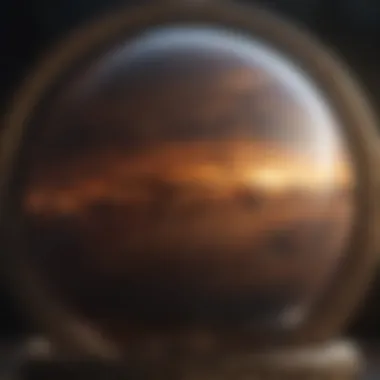Astrology for Me Today: Cosmic Influences Explained


Intro
Astrology is often perceived as an intricate tapestry, woven from celestial movements and earthly experiences. In daily life, it offers unique insights that aid in personal growth and decision-making. Each astrological sign carries distinct characteristics and influences. Understanding these can enhance one’s ability to navigate both personal and interpersonal aspects of life. From horoscopes to birth charts, astrology serves as a guide, merging the cosmic and the quotidian.
Characteristics of Each Zodiac Sign
Overview of personality traits
Astrology categorizes individuals into twelve zodiac signs, each embodying a set of personality traits and tendencies.:
- Aries: Assertive, courageous, and often impulsive.
- Taurus: Reliable, patient, and sometimes stubborn.
- Gemini: Versatile, curious, but can be indecisive.
- Cancer: Nurturing, sensitive, often protective of loved ones.
- Leo: Charismatic, confident, and can be domineering.
- Virgo: Analytical, meticulous, occasionally overly critical.
- Libra: Diplomatic, sociable, but may struggle with indecision.
- Scorpio: Intense, passionate, and often secretive.
- Sagittarius: Adventurous, optimistic, sometimes blunt.
- Capricorn: Disciplined, responsible, and may appear cold.
- Aquarius: Innovative, independent, can be aloof.
- Pisces: Compassionate, imaginative, prone to daydreaming.
These descriptors offer a glimpse into how each sign navigates life.
Strengths and weaknesses
Each sign also encompasses strengths and weaknesses:
- Aries: Strength - Leadership; Weakness - Impulsiveness.
- Taurus: Strength - Dependability; Weakness - Stubbornness.
- Gemini: Strength - Communication; Weakness - Restlessness.
- Cancer: Strength - Intuition; Weakness - Moodiness.
- Leo: Strength - Charisma; Weakness - Egoism.
- Virgo: Strength - Practicality; Weakness - Overthinking.
- Libra: Strength - Fairness; Weakness - Avoiding conflict.
- Scorpio: Strength - Determination; Weakness - Jealousy.
- Sagittarius: Strength - Enthusiasm; Weakness - Tactlessness.
- Capricorn: Strength - Ambition; Weakness - Pessimism.
- Aquarius: Strength - Originality; Weakness - Nonconformity.
- Pisces: Strength - Empathy; Weakness - Escapism.
Compatibility with other signs
Astrological compatibility can shape romantic relationships and friendships. Sign combinations can create harmonious or challenging dynamics. For example:
- Aries and Leo: Often a passionate and dynamic duo.
- Taurus and Cancer: Typically create a nurturing partnership.
- Gemini and Libra: Often enjoy stimulating conversations.
- Scorpio and Pisces: Usually form an intense emotional bond.
These interactions emphasize the value of understanding astrological signs in relationships.
Daily, Weekly, Monthly Horoscopes
Horoscopes provide tailored insights based on the movements of celestial bodies:
Predictions for each zodiac sign
Daily, weekly, and monthly horoscopes offer forecasts that help individuals focus on key life areas. Each sign receives tailored guidance, feeding into decisions, plans, and emotional response.
Key areas to focus on
Common focus areas in horoscopes include:
- Career moves and opportunities.
- Relationship developments.
- Personal health and wellness.
- Emotional stability and growth.
Love and Relationships Horoscopes
Love and relationships are often the focal points of many readings. Specific horoscopes highlight romantic possibilities and challenges for each sign.:
- Aries: A bold approach may attract partnerships.
- Taurus: Seeking stability might lead to deeper connections.
- Scorpio: Intensity in relationships often awakens transformative experiences.
How to Interpret Tarot Cards
Tarot, often intertwined with astrology, provides additional insights:
Major and Minor Arcana
The Tarot consists of Major Arcana, reflecting significant life events and themes, and Minor Arcana, highlighting daily experiences.
Meaning of key cards
Key cards include:
- The Fool: New beginnings and adventures.
- The Lovers: Relationships and choices.
- The Death card: Transformation and endings.
Sample interpretations in different spreads
Various spreads, such as the three-card or Celtic Cross, offer different dimensions of interpretation depending on the question and context.
Overview of deck styles
Numerous Tarot decks exist, each with unique artwork and themes. Some prominent ones are the Rider-Waite-Smith and Thoth decks, which contain distinct interpretations of symbols.
Popular decks and their unique features
Decks like the Wild Unknown or Shadowscapes highlight individualistic artistry, enriching personal readings.
Understanding Birth Charts
Birth charts are pivotal in astrology, providing a snapshot of the universe at the moment of a person's birth.
Components of a birth chart
A birth chart consists of:


- The Sun sign: Core identity.
- The Moon sign: Emotional nature.
- Rising sign: Social persona.
How to interpret planetary positions
Each planet, positioned in a specific sign, affects various aspects of personality, behavior, and experiences.
Impact of zodiac signs on personality
Zodiac signs play a crucial role, influencing various traits and dynamics in one's life journey.
Astrological Events and Celestial Occurrences
Astrology recognizes significant celestial occurrences and their impact.
Lunar and solar eclipses
These events often signal turning points and important life shifts.
Retrogrades of planets
Planets in retrograde are critical times for reflection and reassessment. For example, Mercury retrograde often brings communication challenges.
Key astrological dates to watch out for
Important dates, such as solstices and equinoxes, also resonate with astrological energies, allowing for mindful planning and reflection.
Beginners Guide to Astrology
For those new to astrology, understanding horoscopes and signs is fundamental.
Basics of horoscopes, zodiac signs, tarot, and astrology
Newcomers should familiarize themselves with the essential concepts, while gradually integrating knowledge from readings.
Utilizing insights from readings for personal development
Astrological insights can guide individuals in self-discovery, helping them cultivate understanding and growth, enhancing the quality of everyday life.
Astrology serves not only as a tool for empowerment but also as a means of connecting with the larger cosmos.
Intro to Astrology
Astrology serves as a useful framework for understanding time-honored beliefs that connect human experiences with celestial movements. It plays a significant role in guiding individuals through their daily choices, revealing patterns in behavior and emotions influenced by the cosmos. By exploring astrology, one opens the door to insight and awareness not only about themselves but also about relationships with others.
The study of astrology delves into how the positioning of celestial bodies like planets and stars impacts events on Earth. Each zodiac sign carries distinct characteristics, strengths, and weaknesses. This understanding can enhance decision-making and foster personal growth.
Historical Context
Astrology's origins trace back to ancient civilizations, where it was intertwined with mythology and spirituality. The Babylonians were among the first to systematically study the stars, developing a form of astrology around the second millennium BCE. They observed the cyclical patterns of celestial movements and recorded their findings on clay tablets.
The Greeks later adopted these Babylonian methodologies, infusing their philosophical beliefs and enhancing the framework we recognize today. Notable figures, including Ptolemy, further codified these insights within texts that shaped astrological practices throughout history.
Astrology was also integrated into various traditions across cultures, imparting wisdom across religious and spiritual practices. The evolution of astrology as a discipline saw it face periods of scrutiny and endorsement, reflecting changing societal views.
Astrology vs. Astronomy
Astrology and astronomy, while commonly confused, serve distinct purposes. Astronomy is a science focused on celestial objects, space, and the physical universe as a whole. It employs rigorous methodologies and empirical data to understand celestial mechanics. Astrophysicists study phenomena such as black holes and cosmic radiation, emphasizing observable facts.
Conversely, astrology interprets celestial movements primarily in connection to human experience. Its base lies in the belief that the positions of celestial bodies at the time of one's birth can shape personality and life events. While astronomy seeks to explore what exists beyond Earth, astrology provides a lens through which individuals can gain insights into their lives.
In summary, distinguishing between astrology and astronomy helps clarify how they both contribute to our understanding of the universe. While both fields deal with celestial phenomena, their approaches, methodologies, and implications for personal development differ significantly.
"Astrology's real value exists in its ability to navigate complex human experiences, providing clarity in the midst of uncertainty."
Incorporating astrology into daily life allows individuals to align their actions with the broader cosmic rhythms, enhancing their sense of purpose.
How Astrology Works
Astrology holds a unique significance in interpreting cosmic influences that affect human behavior and events. By examining astrological frameworks, seekers can grasp a clearer understanding of their lives, offering a perspective that resonates through daily experiences. This section will explore the key components of astrology, detailing how these elements interact and shape individual journeys.
The Zodiac System
The Zodiac System consists of twelve astrological signs, each representing a distinct set of characteristics and traits. These signs, from Aries to Pisces, serve as powerful symbols guiding individuals. Each sign corresponds to specific elements: Fire, Earth, Air, and Water. These elements provide insight into how a person's personality might operate within the cosmic framework.
Understanding one’s zodiac sign can assist in identifying personal strengths and weaknesses. For example, a Leo may embody traits such as leadership and creativity, while a Virgo may focus on analytical skills and organization. The zodiac signs offer a map of personality traits, facilitating self-reflection and growth.
Influence of Planetary Movements
Planetary movements significantly influence daily life. Planets, including Mars, Venus, and Jupiter, carry specific energies that shape the astrological landscape. The positions of these celestial bodies at the time of a person’s birth set the foundations of their astrological identity.
For instance, when Mars is in retrograde, it can affect communication, potentially leading to misunderstandings. Conversely, a favorable position of Venus can enhance relationships and attract positivity. Keeping track of these movements allows individuals to align their actions with cosmic energies, maximizing potential benefits in various life aspects.
Understanding Birth Charts


A birth chart, or natal chart, is a personalized map of the sky at the exact moment of one’s birth. It provides deep insights into an individual’s personality, life challenges, and opportunities. The chart consists of houses, signs, and planets, all interacting in unique ways.
The significance of interpreting a birth chart cannot be overstated. It guides individuals in realizing their potential and navigating life’s complexities. Important elements of a birth chart include the Sun sign, Moon sign, and Ascendant. Each of these factors contributes to the overall understanding of a person's nature and how they relate to the world.
Daily Horoscopes
Daily horoscopes hold a significant place in the study of astrology. They provide insights into the energies affecting individuals on a day-to-day basis. This offers a moment of reflection and guidance. Many believe daily horoscopes can enhance decision-making and influence personal conduct depending on current cosmic events. Understanding how to navigate these energies can yield positive experiences.
What to Expect
When reading your daily horoscope, you can expect a summary of influences based on planetary movements and your zodiac sign. Each day may bring challenges or opportunities influenced by celestial bodies. This can range from emotional insights to practical advice on career or relationships. For many, this insight serves as a roadmap for navigating the complexities of daily life. Expect to see themes that resonate personally, enabling you to align your actions with cosmic rhythms. The intent is to harmonize your inner self with the universe.
Interpreting Your Daily Horoscope
Interpreting a daily horoscope requires an awareness of several factors. First, identify your zodiac sign. Then, look at key planetary positions. Each planet influences different aspects of life, such as love, work, and personal health. Here are some steps to interpret your daily horoscope effectively:
- Read the General Theme: Begin by understanding the broader narrative of the day.
- Identify Specific Guidance: Look for actionable advice tailored to your needs.
- Consider Emotions: Reflect on what emotional states may arise.
- Timeline Awareness: Not all predictions may manifest immediately; understand long-term influences.
A holistic reading involves looking beyond mere words. Engage deeply with the energy portrayed. Ultimately, the goal is for you to align your daily actions with the cosmic influences.
"The stars can guide us, but it is we who must take the steps toward our desired direction."
With these techniques, daily horoscopes transform into practical tools for personal growth and understanding.
Zodiac Signs Explained
Understanding zodiac signs is crucial for anyone interested in astrology. These signs offer insights into personality traits, behaviors, and emotional tendencies linked to astrological placements. Each sign has its own unique characteristics, allowing individuals to identify with specific traits and tendencies.
The zodiac consists of twelve signs, divided into three groups: fire, earth, air, and water. Each element shapes how those signs express themselves. For instance, fire signs such as Aries and Leo are known for their passion and enthusiasm. In contrast, earth signs like Taurus and Virgo tend to be grounded and practical.
Benefits of Knowing Your Zodiac Sign:
- Self-Discovery: Gaining insight into your own personality.
- Relationship Understanding: Seeing how different signs interact in social situations.
- Life Guidance: Using this information to make better decisions aligned with your natural tendencies.
Being aware of these traits enhances self-awareness and promotes effective communication between individuals.
Characteristics of Each Sign
Every zodiac sign offers a distinctive set of traits. Here is a brief overview:
- Aries: Adventurous and bold, often taking the lead in endeavors.
- Taurus: Dependable and stable, they appreciate comfort and beauty.
- Gemini: Inquisitive and adaptable, known for their duality in nature.
- Cancer: Nurturing and emotional, with strong family ties.
- Leo: Charismatic and confident, they enjoy the spotlight.
- Virgo: Analytical and detail-oriented, they value organization.
- Libra: Diplomatic and sociable, they seek harmony in relationships.
- Scorpio: Intense and passionate, often protective of their emotions.
- Sagittarius: Optimistic and freedom-loving, they value independence.
- Capricorn: Disciplined and ambitious, aiming for long-term success.
- Aquarius: Innovative and independent thinkers, often ahead of their time.
- Pisces: Compassionate and artistic, known for their kindness.
Each sign reflects a different emotional landscape. Such understanding can facilitate better interpersonal relationships.
Compatibility Among Signs
Compatibility in astrology refers to how well two different signs can relate to one another. Certain signs naturally mesh better based on their elemental groupings. Understanding these compatibilities helps in personal relationships and friendships.
Compatible Element Pairings:
- Fire Signs (Aries, Leo, Sagittarius) generally create strong bonds with other fire signs and air signs (Gemini, Libra, Aquarius).
- Earth Signs (Taurus, Virgo, Capricorn) align well with each other and with water signs (Cancer, Scorpio, Pisces), fostering stability.
- Air Signs effectively socialize with one another and with fire signs, sharing enthusiasm and intellectual discussion.
- Water Signs frequently connect deeply with each other or earth signs, emphasizing emotional depth and security.
Understanding compatibility among zodiac signs can greatly enhance personal relationships by fostering mutual respect and awareness of differing needs.
The Role of Tarot in Astrology
Astrology and tarot share a rich tapestry woven from the threads of ancient wisdom. Both systems offer deep insights into the human experience, yet they approach this from different angles. The role of tarot in astrology provides individuals an entire spectrum of understanding the cosmic influences in their lives. Where astrology deals primarily with celestial bodies and their effects, tarot draws on archetypes and symbols that mirror one's inner state.
Tarot Cards Overview
Tarot consists of 78 cards divided into two main sections: the Major Arcana and the Minor Arcana. The Major Arcana features 22 cards that represent significant life events and spiritual lessons. Each card signifies an archetypal theme such as The Fool, The Lovers, or The World. Conversely, the Minor Arcana consists of 56 cards categorized into four suits, each reflecting more granular aspects of daily life.
These cards function as a mirror, reflecting both the universal and personal situations one faces. When combined with astrological principles, tarot cards can amplify key insights derived from horoscopes and planetary positions. For example, drawing The Wheel of Fortune card may indicate a turning point, resonating with a current Jupiter transit prompting growth or luck.
"Tarot unveils hidden layers of understanding, complementing astrological insights with its own depth of meaning."
Integrating Tarot with Astrology
The integration of tarot and astrology can be a transformative experience. Astrologers often use tarot as a powerful tool to enhance their readings, providing a more nuanced understanding of the zodiac signs and planetary movements. This synergy allows practitioners to see how astrological influences unfold in everyday life.
Some considerations when integrating tarot with astrology include:
- Choosing Corresponding Cards: Each zodiac sign corresponds with certain tarot cards. For example, The Emperor relates to Aries, representing leadership and initiative. Knowing these associations can deepen readings.
- Timing and Cycles: Utilize tarot spreads to access insights regarding specific astrological events, such as eclipses or retrogrades. This can provide clarity on how these events may affect one’s life directly.
- Personal Reflection: The combination encourages personal growth through self-exploration. Reflecting on tarot spreads in relation to one's birth chart fosters self-awareness and alignment with cosmic energies.
By merging tarot and astrology, individuals can experience a multidimensional approach to understanding their paths. Both forms of divination invite one on a journey of discovery, encouraging both self-awareness and proactive decision-making.
Personal Growth through Astrology
Astrology can serve as a catalyst for personal growth. Engaging with astrological principles allows individuals to uncover deeper insights about themselves. Understanding one's birth chart, for instance, reveals unique traits and potential life paths. This awareness fosters a sense of self-acceptance, setting the foundation for meaningful personal development. Benefits can also extend beyond individual reflection; they encompass relationships, career choices, and emotional well-being.
Moreover, astrology provides a framework to interpret life's challenges and milestones. Instead of viewing obstacles as mere misfortune, individuals can see them as opportunities for growth. This perspective shift empowers individuals to embrace change and navigate their life with intentionality, opening pathways to new experiences.


Astrology emphasizes timing as well. Understanding when certain energies are favorable can enhance decision-making processes. Recognizing aspects during specific planetary transits equips individuals to make choices that align with the universe's rhythm. Such alignment can lead to a more fulfilling and balanced life.
Self-Awareness and Reflection
Self-awareness is a cornerstone of personal growth. Through astrology, individuals engage in reflective practices that encourage deeper understanding of their thoughts, emotions, and behaviors. For example, knowing the position of the Moon at birth informs one’s emotional landscape and instinctual responses. This knowledge facilitates meaningful introspection and offers an opportunity to confront underlying patterns.
Reflective practices can include journaling about one’s experiences in light of current astrological influences. Such activities promote mindful engagement with one’s life journey. When individuals correlate astrological transits with real-time events, they can track changes and respond thoughtfully.
Astrology also offers tools, such as the use of affirmations tied to one’s sun sign. For instance, a person with a Leo sun may focus on self-expression and creativity, reinforcing their natural strengths. This deepened self-awareness cultivates confidence and resilience in the face of life's fluctuations.
Setting Goals Aligned with Cosmic Energies
Setting goals that are aligned with astrological patterns can be immensely beneficial. When individuals work in harmony with cosmic energies, their efforts are often met with enhanced motivation and support. Understanding personal cycles, such as lunar phases, can inform the timing of goal-setting and pursuing aspirations.
For example, the New Moon is an opportune time for initiating new projects or intentions. Conversely, the Full Moon represents completion and reflection, making it suitable for assessing progress and adjusting goals accordingly. This alignment can lead to greater fulfillment and a stronger sense of achievement.
Creating a vision board that incorporates astrological imagery is another strategy. This visual tool keeps the energy of one’s aspirations alive and present, allowing individuals to remain focused on their goals. Engaging with astrology encourages a process of continuous alignment and re-alignment with personal objectives, fostering growth and self-discovery.
In summary, utilizing astrology for personal growth encompasses the exploration of self-awareness and deliberate goal-setting. By understanding their cosmic influences, individuals can harness the energies available to them. This knowledge acts as a guide, encouraging deeper engagement with life and fostering a more intentional existence.
Criticism of Astrology
Astrology has long been a subject of debate and scrutiny, especially from those rooted in scientific rationalism. The importance of understanding criticism in astrology lies in its ability to provide a balanced perspective. Those who seek astrological insights must also engage with the skepticism surrounding the field. This engagement helps in discerning the astrological narratives and the role they play in personal and societal frameworks.
Scientific Perspectives
The scientific community largely rejects astrology. Critics argue that there is little empirical evidence to support astrological claims. Many scientific studies have attempted to test the correlations between astrological predictions and actual outcomes, often concluding that there is no repeatable evidence. For instance, a study published in the journal Nature in 1985 found that astrologers could not predict the birth charts of randomly selected individuals better than chance.
Critics also point out that astrology lacks a plausible mechanism to explain how celestial bodies influence human behavior. While proponents cite gravitational impacts or energy fields, these theories do not hold in rigorous scientific testing. Consequently, the consensus remains that astrology does not adhere to the scientific method, which emphasizes observation, experimentation, and reproducibility.
Cultural Skepticism
Astrology faces cultural skepticism for various reasons. In many societies, astrology is still associated with superstition, relegated to the realms of folklore rather than respected disciplines. This perspective often stems from a system of beliefs where empirical evidence is paramount, much of which stands contrary to astrological practices.
Furthermore, the digital age has opened the floodgates to diverse viewpoints on astrology. Social media platforms and content aggregators like Reddit, or Facebook reveal both the fascination and the disparagement regarding astrological practices. Some communities robustly defend astrology, citing personal experiences and anecdotal evidence as validation of its significance. In contrast, other groups continuously emphasize the need for rational discourse around such topics, leading to vibrant debates.
"The crux of skepticism isn't solely based on scientific validation, but also on cultural beliefs that shape societal attitudes towards astrology."
Understanding these criticisms equips individuals to reflect openly on what astrology means for them. By analyzing both the supportive and critical views, astrology enthusiasts can better navigate their beliefs and practices.
Astrology in Popular Culture
Astrology has woven its way into the fabric of contemporary culture in numerous ways. Its influence can be seen across social media, fashion, lifestyle trends, and even public discourse. The resurgence of interest in astrology, particularly among younger generations, has changed the way we perceive and engage with this ancient practice. It is not just about horoscopes anymore; it speaks to a collective need for guidance and understanding in an ever-complex world.
The significance of astrology in popular culture lies in its ability to provide a sense of identity and community. Many individuals turn to their zodiac signs as a frame of reference for their personal traits and tendencies. This interest in astrological insights often serves as a starting point for deeper exploration of self-awareness and personal growth. By sharing astrological insights online, individuals can connect with others who share similar traits or challenges, creating a sense of belonging.
Astrology Apps and Online Resources
The digital age has transformed how we access and interact with astrology. A plethora of astrology apps and online resources has emerged, making astrological knowledge more accessible than ever. Applications like Co-Star, The Pattern, and AstroFuture provide personalized readings based on users' birth data. These platforms utilize algorithms to analyze cosmic positions and give daily insights, appealing to a tech-savvy audience.
Benefits of using astrology apps include:
- Instant Information: Users can receive real-time forecasts and insights, making it easier to navigate daily life.
- Personalized Experiences: Many apps offer tailored readings, helping users to explore their unique astrological make-up.
- Community Engagement: Most platforms feature social sharing options, allowing users to connect and discuss insights with friends.
Representation in Media
Astrology's representation in media has also evolved, showcasing its appeal beyond the niche communities. Television shows, films, and online content have increasingly featured astrological themes. Programs like "The Good Place" and "The Simpsons" have humorously explored zodiac traits, reflecting societal curiosity about character motivations linked to astrological signs.
Further, popular magazines often include monthly horoscope sections, which cater to a broader audience. This portrayal normalizes astrology, moving it from esoteric realms into mainstream consideration. As more people share their zodiac-related experiences in blogs and social platforms, the perception of astrology as a frivolous pastime is shifting to one of serious interest and inquiry.
"Astrology has become a mainstream narrative rather than a side topic, indicating its strong role in shaping perspectives today."
In summary, astrology’s integration into popular culture signifies a renewed interest and belief in its potential to offer insight. As society becomes more interconnected through technology, astrology stands as a unifying force that encourages exploration of self and connections with others.
Future of Astrology
Astrology is not a stagnant practice; it evolves alongside society, technology, and cultural shifts. The future of astrology holds significant importance in this article as it delves into how ongoing changes will shape astrological practices and understanding. One compelling element is technological advancements. These innovations not only enhance accessibility to astrological tools but also facilitate deeper and more personalized insights for users. With more people turning to astrology for guidance, it becomes vital to consider how technology will continue to influence its growth.
Moreover, astrology is increasingly intertwining with global awareness. This relationship raises questions about the role astrology plays in societal issues, such as mental health and personal identity. Understanding these dynamics can lead to a more nuanced appreciation of astrology's relevance in contemporary life.
Technological Advancements
The impact of technology on astrology cannot be overstated. Applications and software now empower practitioners and seekers alike to analyze and interpret astrological data with unprecedented ease. These tools have democratized access to birth charts, transit information, and daily horoscopes. For instance, apps like Co–Star and The Pattern provide tailored experiences based on individual data inputs, making astrology more personal and engaging.
Additionally, technological advancements are fostering communities where shared knowledge can flourish. Online forums and social media platforms enable users to discuss insights and experiences with astrology, broadening perspectives and encouraging exploration.
Unforeseen developments, such as artificial intelligence, may introduce new interpretations and algorithms that could refine astrological readings. As these technologies mature, understanding their potential becomes essential for practitioners.
Astrology and Global Awareness
Global awareness takes many forms, from collective consciousness to environmental concerns. As people become more attuned to these dimensions, astrology can serve as a tool for introspection and reflection on one's place within larger systems. The growing emphasis on well-being, both mental and emotional, suggests that astrology's insights may hold therapeutic value.
Astrology can guide individuals in understanding their roles within the interconnected web of life. In this sense, it promotes not just personal growth but social responsibility. By recognizing how individual energies interact with global events, practitioners can align their actions with broader humanitarian efforts.
As astrological practices adapt to reflect shifts in societal values, they will likely resonate more deeply with individuals seeking meaning during tumultuous times.
"Astrology may not determine fate, but it can highlight paths to personal development and understanding in the larger context of life."
To summarize, the future of astrology is interconnected with technological advancements and growing global awareness. As these facets evolve, they will redefine how individuals relate with the cosmos and one another.







